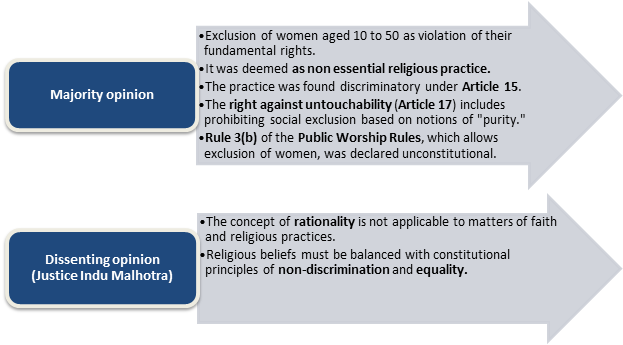Article 25 (Freedom of Conscience and Free Profession, Practice and Propagation of Religion)
-
- Article 25(1): It provides freedom of conscience and the right to freely profess, practice and propagate religion.
- Implications:
- Freedom of conscience: Freedom to mould relationship with God the way one desires.
- Right to profess: Declare one’s religious beliefs openly
- Right to practice: Performance and exhibition of religious beliefs and ideas.
- Right to propagate: Transmission of one’s religious beliefs to others.
- Available to all– citizens and non-citizens
- Article 25(2): State can regulate or restrict any religious activity on the grounds of public order, morality, health etc.
- Two explanations:
- wearing and carrying of kirpans as part of profession of Sikh religion.
- Hindus include Sikhs, Jains and Buddhists.
Article 26 (Freedom to Manage Religious Affairs)
-
- Rights of religious denomination or any other section:
- Establish and maintain institutions for religious purposes
- Manage own affairs in matters of religion
- Own and acquire property- movable and immovable
- Administer such property
- It protects collective freedom of religion.
- SC gave three conditions for a religious denomination:
- A collection of individuals having system of beliefs conducive to their spiritual well-being
- A common organization
- A distinctive name
- Rights of religious denomination or any other section:
Article 27 (Freedom from Taxation for Promotion of a Religion)
-
- No person shall be compelled to pay taxes for promotion or maintenance of any religion or religious denomination.
- State should not spend public money for the promotion of any particular religion.
- Prohibit State from favoring, patronizing and supporting any particular religion.
- Prohibits levy of a tax but not fee.
Article 28 (Freedom from Attending Religious Instruction)
-
- No religious instruction shall be provided in any educational institution wholly maintained out of State funds.
- No person can be forced to attend any religious instruction or worship in any educational institution recognized by the State. For minors, consent of guardian is needed.
- Four types of educational institutions:
a) Institutions wholly maintained by the State.
b) Institutions administered by the State but established under any endowment or trust.
c) Institutions recognized by the State.
d) Institutions receiving aid from the State.
-
- In a), religious instruction is completely prohibited while in b), religious instruction is permitted. In c) and d), religious instruction is permitted on a voluntary basis
Anti-Conversion Law
Need for anti-conversion law:
-
- Prevent communal conflicts and fostering societal harmony.
- Address Concerns of fraudulent Marriages
- Protect traditions and beliefs
- Ensure citizens right to freedom of religion
Challenges associated with anti-conversion laws:
-
- Infringe upon fundamental rights under Article-14 and Artilcle-21.
- Threat of discrimination against certain religious groups.
- Era of globalization with focus on multi-cultural cosmopolitan society. In such scenario the effort to maintain status quo in demography and harshly regulating religious conversions may backfire.
- Vagueness in provisions makes them prone to misuse.
Related judgements:
-
- Hadiya vs. Ashokan K.M. (2017): Fundamental right to marry and convert to another religion upheld.
- Lata Singh vs. State of Uttar Pradesh (2006): Right to marry regardless of religion, caste, or social status.
- K.S. Puttaswamy Judgment (2017): Right to privacy includes freedom of religion and personal relationships.
- Sarla Mudgal vs. Union of India (1995): Conversion for marriage is permissible but should not be to avoid legal duties or obligations.
- S. Pushpa Bai vs. C.T. Selvaraj (2010): Right to voluntary religious conversion upheld.
- Rev. Stanislaus vs. Madhya Pradesh (1977): Right to propagate does not include the right to forcibly convert others.
- Bench of Justices MR Shah and Hima Kohli (2021): Forced religious conversion recognized as a grave issue with serious implications for national security, religious freedom, and individual conscience.
Sabarimala Case (2018)
Background:
-
- About: Sabarimala Temple is dedicated to Lord Ayyappa, considered a celibate deity. To maintain this, women between the ages of 10 and 50 were historically prohibited from entering the temple
- Mahendran v. The Secretary, Travancore (1991)- Court justified women’s exclusion as a long-standing custom and didn’t violate women’s equality or religious freedoms.
- Sabarimala Case (2006-2017):
- 2006: The Indian Young Lawyers Association petitioned against the restriction.
- The case was referred to a 3-Judge Bench in 2008 but was heard in 2016, and then to a 5-Judge Constitution Bench in 2017.
SC verdict:
A 4:1 majority decided that the temple’s practice of barring women was unconstitutional.

Significance:
-
- Strengthens constitutional morality
- Promotes gender justice
- Strengthens the foundation of greater rationality, socio-economic change and elimination of discriminatory practices.
- The temple endowment argued that it constituted a separate religious practice was core of its faith.
Essentiality principle in Religion
-
- The doctrine of “essentiality” was introduced by a seven-judge Bench of the Supreme Court in the Shirur Mutt case (1954).
- The court ruled that the term “religion” encompasses all rituals and practices deemed “integral” to a religion and assumed the authority to differentiate between essential and non-essential practices.
- The Essential Religious Practice (ERP) test, developed by the court, aims to protect only those practices that are vital and intrinsic to a religion.
- For instance, in the Ayodhya case, the Constitution Bench held that a mosque is not an essential part of Islamic practice, as namaz (prayer) can be performed anywhere, even in the open.
- Religious practices deemed essential are safeguarded from State interference, subject only to the reasonable restrictions outlined in Article 25 of the Constitution.
- Conversely, non-essential religious practices are not regarded as fundamental rights and may be regulated by the State on legitimate grounds.




